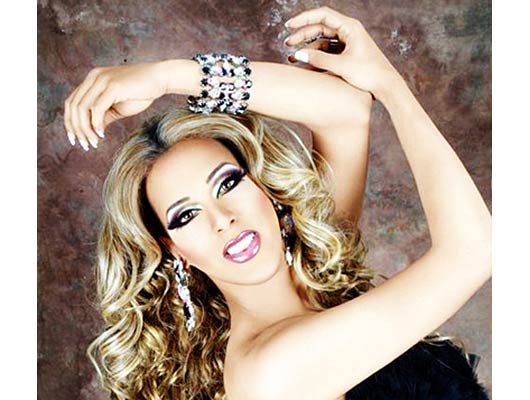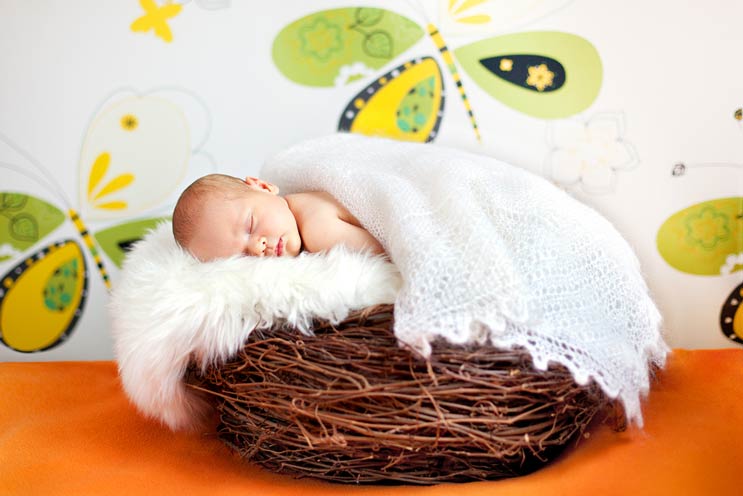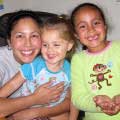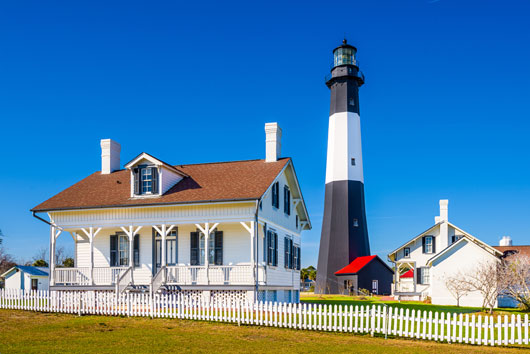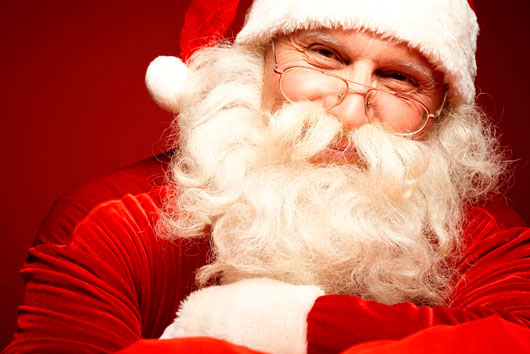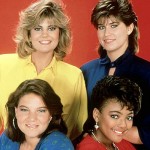Anyone who knows me personally knows that my favorite TV show of all time is Rupaul’s Drag Race. It’s everything I always wanted Project Runway and America’s Next Top Model to be, plus it’s about a squillion times more entertaining.
I don’t know if it’s because I’m from a town with a pretty active drag scene (it also happens to be Rupaul’s home town; we were even born in the same hospital), but I’ve been a huge fan of drag my entire life.
If you ever feel like you can’t be exactly who you want to be, get yourself to a good drag show. One of the most fun things I’ve gotten to do as a blogger was appearing (with some of my blogging friends) on one of my favorite web shows, He Said, She Said, which is filmed here in San Diego and is hosted by the wonderful Aaron Heier and the incomparable drag queen, Ophelia Later.
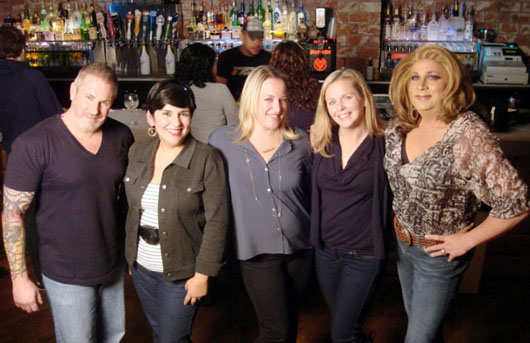
Aaron Heier (@AHizz), Me, Beth (@HipMamaB), Theresa (@RockOnMommies) & Ophelia Later (@OmazingNSD) Image via hsss.tv
Read Related: How To Talk To Your Kids About Gay Parents
We talked about many issues that affect all families, including bullying, tolerance, unconditional love and acceptance, whether people are LGBTQIA or not. Did I lose you there? LGBTQIA stands for Lesbian, Gay, Bisexual, Transgender, Questioning, Intersexual and Asexual. My friends and I have been very public supporters of the “NOH8” campaign and Theresa, in particular, has taken some serious heat online for doing so.
Having grown up in a very diverse neighborhood, I must admit I have a hard time understanding people who are intolerant of others just because they are different. When it comes to my kids, I care whether they are healthy, happy, kind and have lives they are passionate about. I really could care less whether they are gay or straight or otherwise. So when Ophelia Later asked me how I would feel if my son told me he wanted to do drag, I couldn’t help responding, “It would be a dream come true—think of the SHOES he could get me!” Of course, in actuality, that’s a question that involves a lot of “ifs”! IF my son were gay and IF becoming a drag performer was what he really wanted to do then, yes, it would be a dream come true. And yes, the shoes would be fabulous.
TRADITIONAL AND TOLERANT
Even though I grew up in a “traditional” Mexican-American family, I remember everyone being extremely tolerant of others, even the older folks. After all, everyone in my family has experienced discrimination at one point or another. One of my grandparents had a gay sibling and, while we never discussed it openly as a family, nobody EVER said anything negative about that relative or about homosexuals in general. I’m pretty sure if anyone had, there would have been hell to pay! But many of my Latino friends have families who are not necessarily so accepting. In fact, there seems to be a stereotype that we’re not, on the whole, folks who take to things outside of our culture. I’ve heard a lot of people say that it’s just because we’re Latinos, or because of the influence of Catholicism on our culture(s) or because “traditional” families are so important to us. But to be honest, I wonder whether that is really the case.
I spoke with Carolina Ramos, Director of Latino Services for The San Diego LGBT Community Center. I asked her if, in her experience, she felt that Latinos have particular difficulty accepting family members who are LGBTQIA. “Mmmmmmm…don’t be so sure,” she said, “Maybe you should come and ask them yourself!” The Center has many programs for Latinos, including a group for parents of LGBTQIA children that meets weekly. I was invited to attend one of their meetings so I could get a better idea of their journey.
Some of the parents in the group have kids who are gay or lesbian and many of them have children who are transgendered. Most of the parents I met with have come to accept their children as they are (though some have struggled more than others to do so). They came to The Center to support each other and to educate themselves about how best to support their children. Some of the parents said they always knew their child was gay or different, but they didn’t want to push them to come out before they were ready. Those who had trouble accepting their children at first said it was, for the most part because of religious reasons or because they had never met anyone who was LGBTQIA and were simply ignorant of what it was. When I asked them to name the most challenging aspect about being a parent of an LGBTQIA child, every single one of them said it was the fear that others would be intolerant of their child, that they would be discriminated against by people who don’t understand that LGBTQIA are just people with the same rights as everyone else.
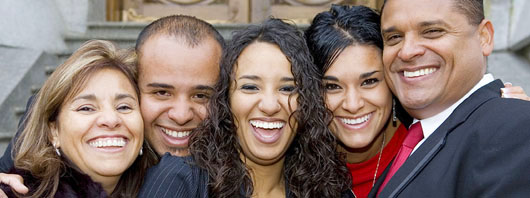
Image via The San Diego LGBT Community Center
ARE LATINOS LESS ACCEPTING?
“But is there anything you’ve dealt with that you’d say is specific to Latinos?” I asked, “Because I have to say, it doesn’t seem as though there is!” The group moderator said, “That’s because there isn’t. These families are dealing with all of the same issues that non-Latino families [of LGBTQIA people] are. There may be a language issue, but otherwise it’s very much the same.” One of the moms added, “If anything, there may be a special challenge for families who are very religious, but Latinos aren’t the only people who are very religious!”
Just to be sure, I not only checked this with many of my non-Latino gay friends and their parents, but I also contacted Ophelia Later (who, despite her name, is not Latino!) and asked if I could interview him and his mom about his coming out and becoming a drag performer, etc. And yes, everyone pretty much confirmed what the Latino Parents’ Group moderator at The Center had told me. Ophelia’s mom, Mary Jo told me that she had always suspected her son was gay. “At first, I thought I could change him, it was such a big deal in those days. I was afraid about what others would think or that they would be rude to him.” She said, “Today it’s no big deal. And I’m so proud that so many people know who my son is, and that he does so much good.”
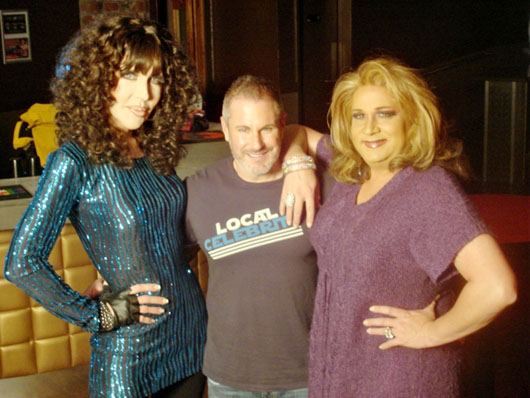
(Left to Right) Chad Michaels from Rupaul’s Drag Race, Aaron and Ophelia on the set of “He Said, She Said”. Image via hsss.tv
I asked Ophelia what is was like to come out to his mom when he was a teenager. “I think [it was] the range of emotions in such a short time frame,” says Ophelia, “My mom grew up in the south, very “Bible belt,” and had all the baggage she had to work through, but I never doubted her love for me and her deep commitment to support me, even while working through her upbringing. I think it was difficult to have to admit it out loud for her [but] once my mind was made up, I just let it out. She had to internally process it, and we were really able to talk about what we were feeling and going through.” Sounds just like a Latino family, no? Ophelia’s mom so reminded me of the mothers I’d met at The Center when she said, “I think families who try to exclude a family member [because they’re different] should be ashamed of themselves.” I can’t believe I forgot to ask her about her shoes!
The families of the Latino Parents’ Group have made a beautiful documentary called Mi Familia in which they describe, at length, the challenges and rewards of learning that their children are LGBTQIA, and how it has brought them all together. It has been shown all over the US, as well as in Chile and Venezuela, to help educate Latino families about these issues so they can find the support they need. To purchase a copy of Mi Familia or to find an organization near you for Latino LGBTQIA family support, please contact Carolina Ramos at the San Diego LGBT Community Center, [email protected].
Wishing you love with extra cheese—
Nacho Mama

